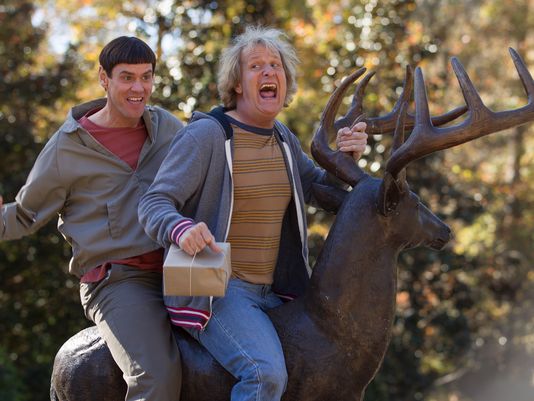
Twenty years of marginal success following 1994’s beloved smash-hit “Dumb and Dumber” have left the sibling-director duo of Bobby and Peter Farrelly no choice but to return to the film that started it all, despite the historically unfavorable track record of comedy sequels.
“Dumb and Dumber To” re-inserts dopey best friends Harry (Jeff Daniels) and Lloyd (Jim Carrey) into the narrative of the first film. The pair sets out, once again, on a foolhardy, narrow-minded mission that tests their friendship, but ultimately brings them closer.
This time, an ailing Harry learns that he somehow fathered an attractive daughter (Rachel Melvin) who has both of her kidneys, one of which he desperately needs.
Lloyd agrees to help track her down, citing his “superior instincts.” But he is, once again, on a journey to find love.
The inclusion of Carrey and Daniels is the only thing that lifts “To” above Harry and Lloyd’s horrendous initial re-visit, “Dumb and Dumberer: When Harry Met Lloyd,” in which both actors were absent.
Carrey seems to have replaced his character’s subtle rapey-ness in the first film with a near-“Mask” level of craziness that Daniels tries, and fails, to match.
However, their chemistry is intact and is responsible for the subtle mannerisms and unintentional quips that make the movie work, notable in scenes like the failed hearing-aid heist or during Lloyd’s argument for Harry to search for his daughter, Penny: “She’s the fruit of your loom.”
Fortunately, “Dumb and Dumber To” doesn’t quite fall into the unnecessary sequel category that includes “Weekend At Bernie’s II,” “Grease 2,” “Teen Wolf Too” and “Men In Black II,” but it’s close. There, the audience is wondering how any collaboration of professionals could actually result in such an abominable finished product.
The feeling after this film’s conclusion is more comparable to that of “Anchorman 2: The Legend Continues”, “GhostBusters II” or “Austin Powers: The Spy Who Shagged Me.” It’s that underwhelming dissatisfaction of sitting through an over-long, sometimes-funny copy of the original, which leaves the audience not questioning the film’s existence as much as why it disappointed them.
The answer, it seems, is the filmmakers’ idea that they can re-create past success by making the same movie they did before. They fail to see that the reason they even achieved success in the first place is because they were creative.
It’s that creativity that they should be going back and pulling from, not the product of it.
Trevor Whitney can be reached at [email protected] or @nicegrandmas on Twitter.










